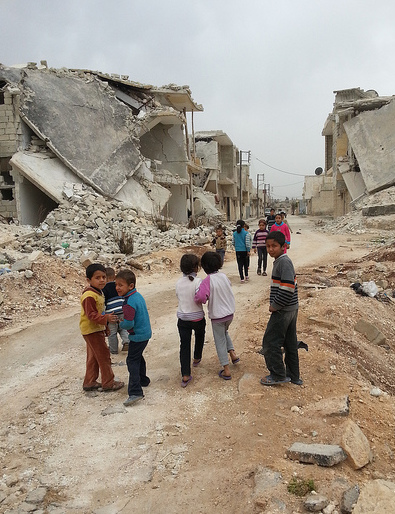During the last part of this year, the devastating harm caused and the need for international action on the use of explosive weapons in populated areas received attention from states at the UN General Assembly First Committee in October, and at the Review Conference of the Convention on Certain Conventional Weapons (CCW) in December. The commitments made by states and others at the World Humanitarian Summit in May were also released in the autumn, with over thirty states vowing to take steps to address this issue in that context.

Children in Azaz, Aleppo governorate in Syria (© IHH Humanitarian Relief Fondation https://flic.kr/p/mC9de1)
Convention on Certain Conventional Weapons
At the CCW Review Conference in December, it was proposed that the issue of explosive weapons be formally considered within the CCW framework, reflecting growing recognition amongst states of the severity of this humanitarian issue, and the increasing commitment from states to it.
Several states spoke up on explosive weapons and supported moves towards action to address the harm to civilians caused by the use of these weapons in populated areas. Austria noted the need for international attention to this urgent humanitarian problem and the initiative it is leading for a political declaration to address the issue internationally, with Mexico raising the need to address technical, ethical and legal issues in states’ discussions and Ireland highlighting the need for more discussion on secondary and tertiary effects, as well as gendered effects. Moldova stated that it would consider the development of a political commitment on this issue, with the Netherlands welcoming international discussions on concrete measures and Canada calling for diversity in such talks. Argentina, Ecuador, Germany and the International Committee of the Red Cross (ICRC) also spoke to express concern at humanitarian harm.
More detailed information and analysis from the CCW Review Conference can be found on the website of INEW member Reaching Critical Will of WILPF here.
First Committee
At the First Committee of the UN General Assembly in October, thirteen states as well as the ICRC and INEW raised this issue. INEW’s statement can be read here. Austria highlighted that the use of explosive weapons in populated areas was a major cause of civilian harm, as well as a major cause of displacement, and also highlighted the international initiative to develop a political declaration on explosive weapons, on which it had hosted a meeting earlier in October and was leading the process on. New Zealand spoke to express support for a declaration, with the Netherlands also supporting international discussions. Costa Rica called for stricter rules and commitments and expressed support for the initiative.
Ireland stated that the use of explosive weapons with wide area effects in populated areas was one of the most serious challenges facing the international community, with South Africa and Guatemala raising their concerns in this area. The Holy See spoke out strongly against ever more powerful and sophisticated weapons being used in ways that devastate whole communities, with San Marino expressing concern at suffering, displacement and death suffered by civilians. Liechtenstein also expressed concern at humanitarian harm, and drew attention to commitments made at the World Humanitarian Summit. Norway noted the UN Secretary-General’s call on states to “refrain from the use in populated areas of explosive weapons with a wide area effect” and expressed a desire to see more states engaging in discussions on this issue, aiming for it to “influence practice and set standards’.
The ICRC expressed concern over the use of heavy explosive weapons in populated areas, which are prone to indiscriminate effects owing to their wide-area impacts, and emphasised the risks of death, injury, disability and damage to critical infrastructure. It called on states to “avoid using explosive weapons with a wide impact area in densely populated areas.”
Read our briefing paper for states for the First Committee
Read INEW’s statement to First Committee
World Humanitarian Summit commitments
At the World Humanitarian Summit in May, several states and other actors made commitments relating to protecting civilians from the use of explosive weapons in populated areas. These commitments have now been published on the Summit website.
A specific joint commitment on the use of explosive weapons in populated areas was led by Austria, joined by Costa Rica, Ireland, Liechtenstein, Luxembourg, Mexico, Mozambique, Spain, and Zambia. Through this commitment these states pledged to raise awareness on this issue, collect data on harm and reverberating effects, contribute to exchanges on good practice to minimise impacts on civilians, and continue to pursue effective international measures on this issue, including through an international political declaration.
Twenty-eight states, as well as the European Union and the Organisation of Islamic Cooperation (OIC), also endorsed the Summit’s core commitment on ‘upholding the norms that safeguard humanity’, which included at commitment to “promote and enhance the protection of civilians and civilian objects, especially in the conduct of hostilities, for instance by working to prevent civilian harm resulting from the use of wide-area explosive weapons in populated areas, and by sparing civilian infrastructure from military use in the conduct of military operations.” These states were: Austria, Brazil, Chile, Croatia, Cyprus, Czech Republic, Denmark, Finland, Greece, Iceland, Italy, Liechtenstein, Luxembourg, Madagascar, Mexico, Monaco, Netherlands, New Zealand, Norway, Poland, Portugal, Romania, Slovakia, Slovenia, Somalia, Sweden, Switzerland and Turkey.
Read INEW’s commitments to the World Humanitarian Summit
Over seventy states have now recognised the humanitarian problem posed by the use of explosive weapons in populated areas, with over sixty calling for action on this issue. As we move into 2017, INEW urges states to conclude this process and practically implement a set of strong commitments on this issue without delay.
